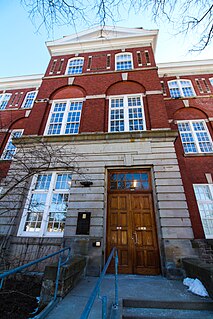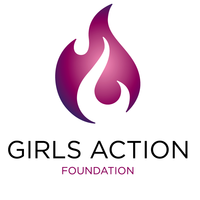
Camp Fire, formerly Camp Fire USA and originally Camp Fire Girls of America, is a co-ed youth development organization. Camp Fire was the first nonsectarian, multicultural organization for girls in America. It is gender inclusive, and its programs emphasize camping and other outdoor activities.

Scouts Canada is a Canadian Scouting association providing programs for young people, aged 5 to 26, with the stated aim "to help develop well rounded youth, better prepared for success in the world". Scouts Canada, in affiliation with the French-language Association des Scouts du Canada, is a member of the World Organization of the Scout Movement (WOSM). 2019-20 youth membership stood at 53,259, an 18% decline from 64,693 in 2014-15. Over the same period, volunteer numbers also declined 18%, from 20,717 in 2015 to 16,885 in 2020. Scouts Canada has declined significantly in size since its peak: youth membership is down 82% from 288,084 in 1965 and volunteer numbers are down 50% from 33,524 in 1965.

A summer camp or sleepaway camp is a supervised program for children conducted during the summer months in some countries. Children and adolescents who attend summer camp are known as campers. Summer school is usually a part of the academic curriculum for a student to make up work not accomplished during the academic year.

Havergal College is an independent day and boarding school for girls from Junior Kindergarten to Grade 12 in Toronto, Ontario, Canada. The school was established in 1894 and named for Frances Ridley Havergal, a composer, author and humanitarian.
Girl Guides of Canada is the national Guiding association of Canada. Guiding in Canada started on September 7, 1910, and GGC was among the founding members of the World Association of Girl Guides and Girl Scouts (WAGGGS) in 1928.
Globaloria is an online learning platform oriented to K-12 curricula to teach students to design, prototype, and code educational web/mobile games and simulations with industry-standard technology as a means of learning content and creative innovation skills. Globaloria was developed in 2006 by Idit Harel as a project of the World Wide Workshop Foundation with the stated mission of providing all primary and secondary school students in the U.S. with STEM and computing education opportunities. Globaloria is noteworthy among MOOCs as it is based in constructionist learning theory and Harel's research in the MIT Media Lab.

iD Tech Camps is a summer computer camp, based in Campbell, California, that specializes in providing computer technology education to children ages 7 through 19. iD Tech Camps are held at more than 150 U.S. college and university campuses and have expanded into international locations as well.
Kidpower Teenpower Fullpower International, commonly shortened to Kidpower, is a 501(c)(3) nonprofit child safety organization teaching child protection and personal safety skills to adults and children to prevent bullying, abuse, abduction, and other violence. Kidpower was founded in 1989 in Santa Cruz, California, and has ten locations in the U.S. and 20 in other countries.
Created in 2003, the Regent Park Film Festival (RPFF) in Toronto, Ontario, is a free community film festival dedicated to showcasing local and international independent works that are relevant to Regent Park. With films from all over the world, the festival aims to provide the residents of Regent Park, and beyond, with a forum for dialogue about social issues. The films shown reflect themes such as immigration, inner city issues, cultural identity, and multicultural relationships.
First Tee is a 501(c)(3) nonprofit organization that teaches children life skills through purposed golf lessons. By integrating the game of golf with a life skills curriculum, First Tee attempts to build inner strength, self-confidence, and resilience in participating children. First Tee reaches more than 3.6 million youth annually through programs delivered at chapter program locations, in schools and at youth centers across the country and select international locations.

The College of Engineering and Physical Science (CEPS), is one of seven faculties – referred to as “colleges” – at the University of Guelph in Ontario, Canada. CEPS operates on the University of Guelph main campus, one of four across Ontario, and has one of the largest faculty, staff, and student populations of the seven colleges at U of G.

Girls Action Foundation provides funds and training to over 100 girls’ programs in communities across Canada. It also offers programs, research and support to a network of over 300 partnering organizations and projects, reaching over 60,000 Canadian girls and young women annually, particularly in under-represented communities including Northern, racialised, low-income, Aboriginal and immigrant communities.
Many in Canada share concerns about the current and future roles of women in computing, especially as these occupations increase in importance. As in many nations where computing and information technology are large industries, women in Canada have historically faced underrepresentation in education and industry. As a result, some Canadian women pursuing careers in these fields have had a lack of role models and faced sexism. There are many institutions and initiatives in Canada, however, which seek to increase representation for women in computing fields, as well as the fields of natural science and engineering in general.
Pixelles, located in Montreal, is a non-profit grassroots organization devoted to increasing gender diversity in video game design as a response to issues of sexism in video gaming.
CoderDojo is a global volunteer-led community of free programming workshops for young people. The movement is a grassroots organisation with individual clubs acting independently. A charity called the CoderDojo Foundation operates out of Dublin, Ireland and supports the various clubs by providing a central website and some other support services. Supporters of CoderDojo believe it is part of the solution to addressing the global shortage of programmers by getting young people more involved with ICT learning. The movement has seen significant growth since its founding. The CoderDojo Foundation estimates 1,250 Dojos spread across 69 countries, with a growth rate of several new Dojos every week.

Zuriel Elise Oduwole is an American education advocate and film maker best known for her works on the advocacy for the education of girls in Africa. Her advocacy has since made her in the summer of 2013 at the age of 10, the youngest person to be profiled by Forbes. In November 2014, at age 12, Zuriel became the world's youngest filmmaker to have a self-produced and self-edited work screened, after her film showed in two movie chains, and then went on to show in Ghana, England, South Africa, and Japan.

Django Girls is an international non-profit organization started by two Polish women, Ola Sitarska and Ola Sendecka, to inspire women from all backgrounds to get interested in technology and to become programmers, offering a safe and friendly environment. It is known for the free workshops it hosts to help women to learn to program and for its Django tutorial. It is often supported by the Python Software Foundation, and they often hold sessions at the Python Conference.
Kids Code Jeunesse (KCJ) is a Canadian not for profit organization based in Montreal, Quebec, which helps children in Canada have an opportunity to learn computational thinking through code. The organization was founded in 2013.
Covenant House Toronto is a nonprofit organization that serves, at-risk, homeless and trafficked youth between the ages of 16 and 24. It is based in Toronto, Ontario, Canada and is one of many Covenant House locations based in North America. The Toronto location is the largest agency of its kind in Canada, with 80 per cent of their annual funding coming from donors. The house serves as many as 300 youth a day regardless of their race, religion, sexual orientation, gender identity, or the circumstances that have brought them to their doors. Covenant House also offers services such as education, after-care, counseling, health care, employment assistance, and job training. The organization has also offered their services to more than 95,000 young people since its start in 1982.
Dames Making Games (DMG) is a Toronto-based non-profit organization that provides resources for female interested in the gaming development industry. Providing resources and hosting workshops, Dames Making Games aims to create a comfortable platform for women, non-binary, femme and queer people in the creation of video games.








